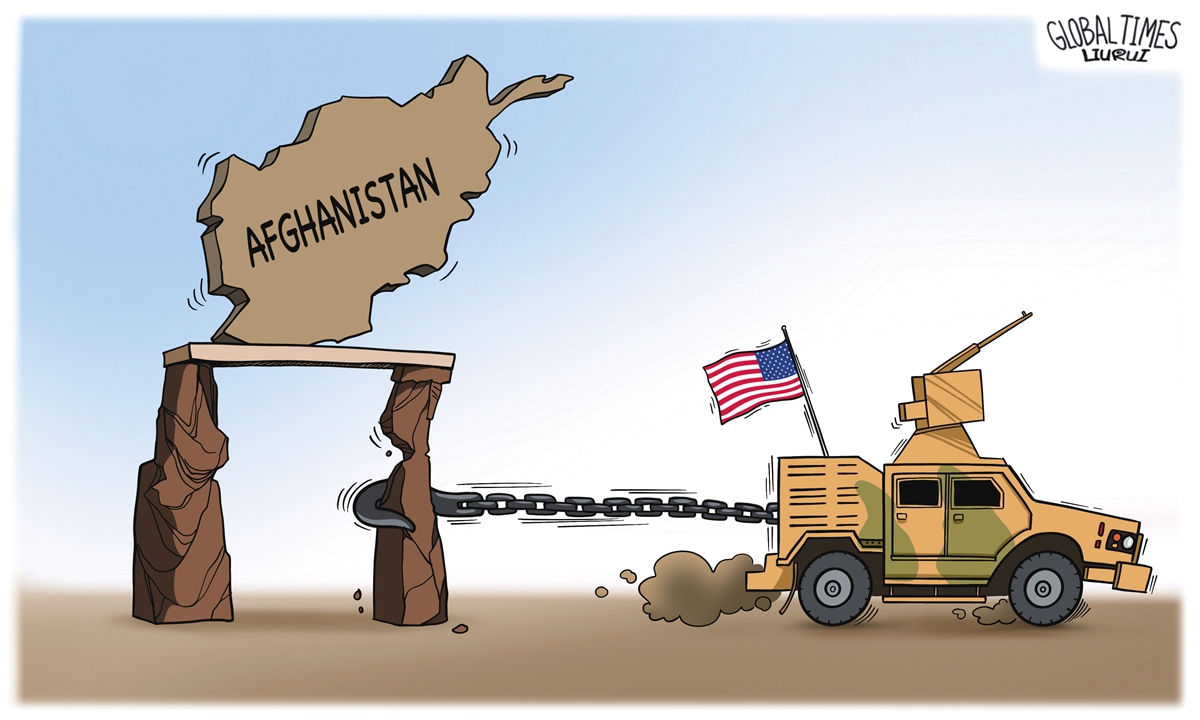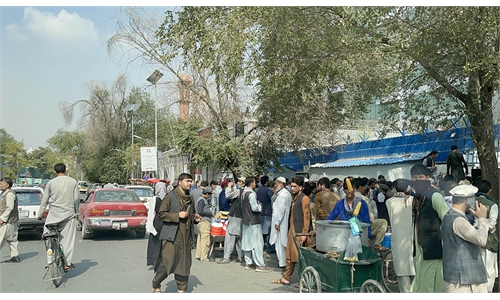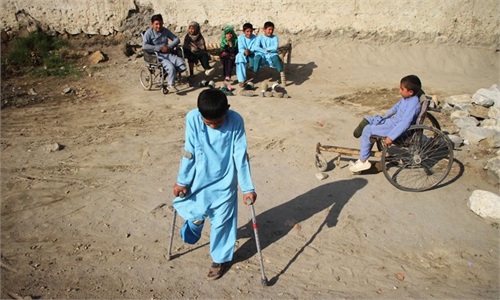COMMENTS / EXPERT ASSESSMENT
CPEC-extension and de-dollarization could help Afghanistan out from under US thumb

Illustration: Liu Rui/GT
As agent of chaos, when the US set its sinister foot in Afghanistan, it created chaos and when it left, created further chaos by freezing assets of Afghanistan which has triggered a humanitarian and economic crisis.
Given the cash-strapped situation, Afghan people are desperately looking for a "Viable Economic Masterplan" to avert spiraling financial and humanitarian catastrophes that are loom large.
In this context if agreed by all stakeholders, an initiative of CPEC-extension into Afghanistan with introduction of de-dollarization sounds deliverable. It holds credentials to lay down comprehensive roadmap allowing Afghan traders to fix their economic hardships, worsening economic situation and impaired commercial prospects.
China Pakistan Economic Corridor (CPEC), one signature project of the Belt and Road Initiative (BRI), is equipped with full potential to make a difference for the Afghan public as it already did and continues to do in Pakistan. Since its launch in 2015 till date, CPEC has minimized people's economic woes. It has accelerated trade and business activities that created thousands of direct and indirect jobs. People's living standards and future prospects have been improved since CPEC helped in resolving chronic challenges of power shortage, dilapidated road and transport infrastructure and stagnant industry. By unleashing agro-based developments, CPEC has been laying down the foundation for a modern agricultural industry in Pakistan. The same even more advantages can be reaped by Afghanistan after having been incorporated with CPEC.
Afghanistan is also already beneficiary of favorable CPEC policies through Pakistan Afghan Transit Trade that accounted for more than $2 billion in 2018. Through Gwadar Port, the crown jewel of CPEC, containerized shipments plying on CPEC roads reached to Afghanistan many times demonstrating to the world the benefit of the CPEC and its spirit of regional connectivity aimed at materializing the dream of a shared destiny.
In a grim scenario that has hampered dollar inflow in Afghanistan which seems to be a US' punishment on the Taliban for taking control in Afghanistan, a strategy of de-dollarization drive may also prove to be a silver lining. It is a unique opportunity to introduce a substitute currency to overcome economic turmoil instead of being bonded to the dollar's hegemonic influence that is losing its luster globally.
Luckily, environment is conducive for a game-changing move to stay unaffected from grave financial outlook that may be unleashed by Washington on the pretext of its own self-made human rights standards and disobedience to its own-created rules to control the world.
Many regional players are putting their full weight behind termination of the dollar regime. Experts believe that global trading and financial system is in jeopardy as US dollar hegemony gives lisence to Washington to impose sanctions on any nation that does not embrace America's policies or that carries out activities that the US government deems a threat to its national interests. A number of European countries have been suffering through economic stagnation while bearing the brunt of US sanctions imposed on potential EU trading partners, including Iran and Russia. The same is true for numerous Middle Eastern and South Asian countries. They all see the value of de-dollarization to unbind their countries from destructive US policy and leadership.
It is happy sign that there is fertile ground to sow the seeds of CPEC connectivity with Afghanistan and de-dollarization. China, Afghanistan and Pakistan, main stakeholders, are on same page to make things happen.
The spokesperson for China's Foreign Ministry Zhao Lijian reaffirmed during regular briefing that China is interested in working with Pakistan under CPEC and extending it to other regional countries in the hopes of improving regional connectivity and economic integration.
In 2019, the main products that Afghanistan exported to China were nuts, non-retail pure cotton yarn, dried fruits, animal hair, and soapstone. In return, China mainly exported rubber tires, synthetic filament yarn woven fabric, broadcasting equipment, semiconductor devices, and electronic transformers to Afghanistan. Pakistan can increase its exports of fruit, vegetables, machinery, textile goods and a lot more to Afghanistan through CPEC potential connectivity.
Economist Mian Khalil mentioned that the CPEC, a flagship project under the BRI, aims to deepen regional and international connectivity to rejuvenate economic growth, so if CPEC gains entry into Afghanistan, the war-torn landlocked territory will relish development bonanza. The expected windfall may come up in the shape of extension of CPEC projects with Afghanistan especially in the field of road and rail infrastructure, energy sector, high-tech industrialization and market-based commercial hubs.
Renewed connectivity will pave way for significant foreign investment that will open the flood gates for more well-paying jobs. Pakistan senior Economist Javed Jahanzaib is hopeful that if CPEC-Afghanistan linking plan comes into force, it will be best shot in the arm for Afghanistan' fragile economy that has reached at the brink of collapse.
At a webinar on "Regional integration and CPEC: the case of Gwadar Port" organized by Institute of Regional Studies (IRS), Director Chinese Study Centre, National University of Science & Technology, Syed Hassan Javed opined that inclusion of Afghanistan into CPEC will be a welcoming development since China will serve as the stabilizing factor in Afghanistan, according to media reports.
In practical terms, few initiatives are linking CPEC with Afghanistan which is at the intersection of South Asia, Central Asia, and West Asia.
Predominantly, the plan is on the cards to connect Peshawar (Pakistan city) to Jalalabad (Afghanistan city) by rail. Former Pakistan Railways Minister Sheikh Rashid Ahmad revealed that Main-Line-I (ML-I), high priority project of CPEC, railway track will be extended by 154 km, from Peshawar to Jalalabad in Afghanistan. "The railway link between Pakistan and Afghanistan will help both the countries improve bilateral trade and facilitate the movement of thousands of passengers who cross the border daily," Farrukh Habib, minister of state for information and broadcasting said, according to media reports.
Meanwhile, if CPEC connects to Afghanistan, the country will be in a position to make joint management of common rivers starting from Kunar River - a major tributary of Kabul River contributing almost 13 million acres feet (MAF) annually to Pakistan. Under CPEC, 870MW run-of-the-river Suki Kinari hydropower project is being built on Kunar River.
The author is founder and president of the Institute of International Relations and Media Research in Pakistan. bizopinion@globaltimes.com.cn



